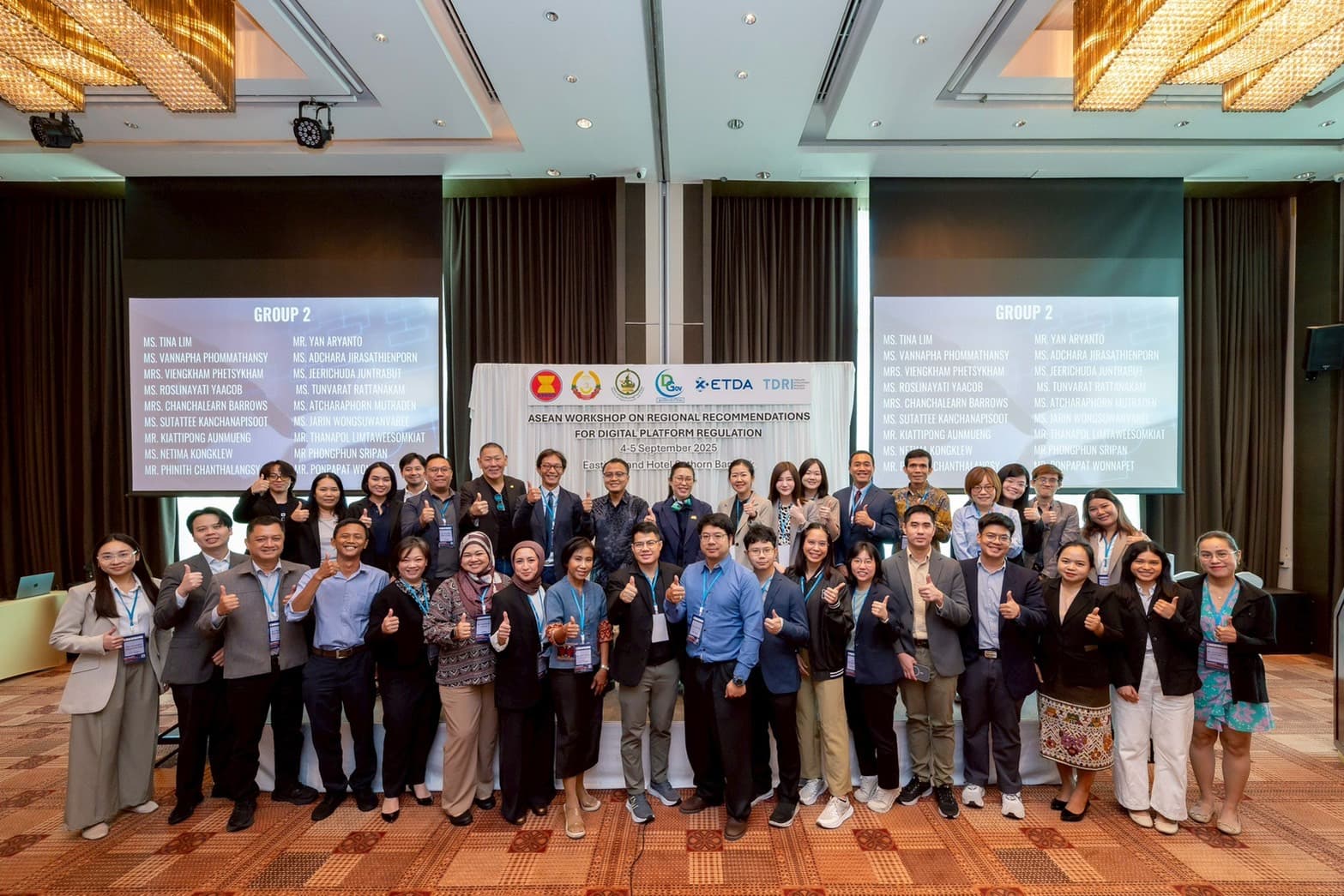
Digital Platform Service
- 30 ก.ย. 68
-
 813
813
-
ASEAN and the world exchange views on platform governance
“As the digital economy becomes central to growth across South-East Asia, regulating online platforms that operate seamlessly across borders, yet often without a physical presence in any given country, has emerged as a challenge no state can face alone. Against that backdrop, Thailand’s Electronic Transactions Development Agency (ETDA), in partnership with Laos’s Ministry of Technology and Communications, hosted the ‘ASEAN Workshop on Regional Recommendations for Digital Platform Regulation’ in Bangkok on September 4th–5th. Officials and scholars from ASEAN member states, together with representatives from the ASEAN Secretariat, joined peers from UNESCO, the European Union, the United States, and Japan.
It was ASEAN’s first attempt to design a collective approach to platform governance. The emphasis was on flexibility: rules that can be adapted to national contexts but built on shared understandings of risks, market power and consumer harms.
The United States: transparency with responsibility
One of the most prominent voices was Professor Anupam Chander of Georgetown University. He recalled the origins of intermediary liability law in the United States, particularly Section 230 of the Communications Decency Act, which shields platforms from legal responsibility for user-generated content.
Poorly considered reforms, he warned, risk backfiring: forcing platforms to over-censor or stifling political speech. “When platforms fear liability, they will not take risks, and the diversity of voices in society will disappear,” said Professor Chander. The key, he argued, is “promoting responsibility without undermining freedom.”
Ms. Mina Narayanan, from the Center for Security and Emerging Technology (CSET), turned to emerging laws on artificial intelligence. She pointed to the Colorado AI Act, which requires risk-management systems for AI, especially in employment, finance and health. She said, “ transparency is not about opening up source code but about explaining how AI shapes outcomes that affect people’s lives.” She urged ASEAN to consider frameworks for algorithmic impact assessments and explainable AI.
Japan and Europe: from self-regulation to shared standards
From Japan, Dr. Qi Jun Kwong of Hokkaido University described a regulatory model that is incremental rather than sweeping. Unlike Europe’s Digital Services Act (DSA), Japan has pursued sector-specific statutes and policies, such as the Act against Unjustifiable Premiums and Misleading Representations and the Act on Specified Commercial Transactions, that apply directly to digital platforms. Alongside these hard laws, soft law initiatives have encouraged platforms to increase transparency, including guidelines on recommendation systems.
From Europe, Mr. Menno Cox, a consultant with the European Commission’s DG CONNECT, recounted the EU’s experience designing and enforcing two landmark statutes: the Digital Services Act (DSA) and the Digital Markets Act (DMA). These measures, among the most ambitious in the world, target not only platform liability but also the economic power and data dominance of the largest firms. He stressed that the DSA and DMA are more than laws: they are regional cooperation platforms, introducing tools such as algorithmic audits, risk-mitigation plans, crisis protocols and trusted flaggers. ASEAN countries, Mr. Cox suggested, need not transplant the DSA or DMA wholesale. Instead, they should study their “logic” and “systemic mechanisms”: risk definitions, public databases of platform behaviour, and forms of algorithmic disclosure that users can understand.
UNESCO: tying governance to human rights
UNESCO also played a central role. Mr. Joe Hironaka, Regional Advisor, stressed that governance should not be seen solely through economic or security lenses but must also reflect human rights, civic participation and digital governance principles. Mr. Phinith Chanthalangsy, Regional Advisor, added: “We should foster a digital ecosystem that is transparent, sustainable and enables citizens to access information that is accurate, safe and unblocked.” He recommended that ASEAN governments use UNESCO’s Internet Universality Indicators as benchmarks when designing platform policy.
A Thai perspective: regulatory trends in ASEAN
The workshop also launched a draft set of regional policy recommendations, informed by a survey of ASEAN regulators. Dr. Saliltorn Thongmeensuk, Senior Research Fellow at the Thailand Development Research Institute (TDRI), presented the findings.
“We are seeing a global trend where regulators are asking what tools are needed to make platforms safe and transparent without choking innovation,” Dr. Thongmeensuk observed. Across a growing number of jurisdictions, regulators are replacing broad safe-harbor protections with minimum duties for platforms, particularly around illegal content.
On the economic front, regulators worry that dominant platforms are squeezing competitors—by tying app installations to their own stores, ranking their services above rivals in search results, or setting terms that make it harder for newcomers to compete. Some countries have responded by adding ex-ante rules to their competition regimes, on the view that existing ex-post tools may not be sufficient in fast-moving digital markets, Dr. Thongmeensuk noted. Online scams, meanwhile, remain a pressing concern where ASEAN could develop practical cross-border enforcement.
Lessons from the forum
The discussions underscored that regional cooperation is indispensable, not merely to pass enforceable rules, but to share data, align on risks, foster innovation and protect consumers in a fast-changing world. In the digital age, when information and services flow across borders at the speed of a click, the challenges do not stop at any one country’s frontier. Nor can solutions be built in isolation. Collaboration, participants agreed, is the heart of effective platform governance.
These issues—recognized as priorities for ASEAN and closely linked with global debates on platform governance—will be further explored and discussed at the upcoming ASEAN–UNESCO Multistakeholder Forum on the Governance of Digital Platforms, which Thailand’s Electronic Transactions Development Agency (ETDA), Ministry of Digital Economy and Society, has the honor of co-hosting with UNESCO, in cooperation with the ASEAN Secretariat and the Global Initiative on the Future of the Internet of the European University Institute (EUI), on 20–22 October 2025. Further details are available on ETDA’s official website.
DOWNLOAD Guideline for Digital Platform Regulation in ASEAN
(uploaded on 10 February 2026)